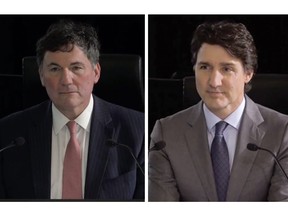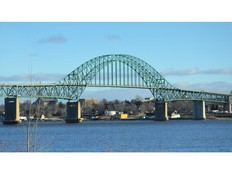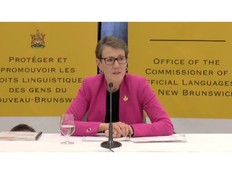LeBlanc and Trudeau questioned on foreign interference
New Brunswick MP, who is the federal minister of Democratic Institutions, and Trudeau both testified on Wednesday in front of public inquiry

Article content
OTTAWA • Dominic LeBlanc says he didn’t learn about specific alleged attempts by foreign actors to meddle in Canada’s elections until after they were leaked and reported publicly by the media.
That’s as he was tasked to review and update the country’s plan to stop foreign interference from happening.
But LeBlanc says knowing about the detailed attempts likely wouldn’t have changed the outcome of his work, stating that he confidently relied on the country’s intelligence officials that knew about the incidents.
The New Brunswick MP, who is the federal minister of Democratic Institutions, and Prime Minister Justin Trudeau both testified on Wednesday in front of the public inquiry into foreign interference in Canadian elections.
The inquiry is investigating allegations that China interfered in the 2019 and 2021 federal elections, which saw Trudeau’s Liberals defeat Andrew Scheer and Erin O’Toole’s Conservative party.
The Trudeau government created the foreign interference commission last September amid mounting pressure to conduct a public inquiry.
That was after a string of reports into foreign meddling, including Chinese attempts to influence elections.
The inquiry has focused in on what government officials knew and when.
LeBlanc held a series of key roles around the time in question.
He was appointed minister of Intergovernmental Affairs in August 2018, a job he had until 2019. After the 2019 election, he was named president of the privy council, which included the portfolio of democratic institutions.
That portfolio saw LeBlanc consider policy changes to support the holding of free and fair elections.
In that role, LeBlanc’s work included reviewing a plan that former Democratic Institutions Minister Karina Gould put in place to protect democracy.
In summer 2020, he was reappointed as the minister of Intergovernmental Affairs until the 2021 election.
After that election, he retained both of those roles, while adding the Infrastructure portfolio.
In 2023, he dropped the Infrastructure portfolio and added Public Safety.
LeBlanc said on Wednesday that he rarely received classified information or briefings from officials in his capacity as the minister responsible for democratic institutions.
That said, he did receive a number of “high level” briefings, with a first one in March 2020 on the “threat landscape” in the aftermath of the 2019 election.
“But it didn’t go into granularity around specific constituencies or specific events,” LeBlanc said.
Instead, he was told that the election was held free from interference.
“That was one of the most significant takeaways for me from that first high-level briefing, that some of the most senior intelligence and security officials in the country confirmed to me their view that the 2019 election was free and fair and that any attempts at foreign interference would not have affected the outcome of the election, including in individual ridings,” LeBlanc said.
“I remember being reassured that the plan that we had put in place, in their view, had been successful.”
LeBlanc was then questioned about whether he knew about specific allegations of interference that were made public by several news outlets.
That included allegations that China interfered in the Toronto Don Valley North Liberal nomination race, that there was potential interference in the Vancouver area involving Chinese proxy agents, and alleged disinformation campaigns targeting Conservatives Kenny Chiu and Erin O’Toole.
“I knew that China used social media platforms, particularly WeChat, to propagate campaigns of disinformation and misinformation, but the first time I learned about the specific allegations either with respect to Mr. O’Toole or Mr. Chiu was following the public release of this information,” LeBlanc said, citing reported leaks.
LeBlanc was also careful to say that the allegations don’t mean any of the instances were actually true.
Later asked if his review of efforts to stop foreign interference would have benefitted from those details, LeBlanc contended they likely wouldn’t have.
“I’m not sure if this level of granularity would have made a significant difference,” LeBlanc said, adding that he took direction from the top security officials who said there wasn’t a major concern.
But LeBlanc was then asked if he expects that detail as a Public Safety minister, which he said he does.
Wednesday’s testimony also revealed that LeBlanc was briefed less often than his predecessor.
Gould, who testified before him on Wednesday, said she had briefings with intelligence officials every month.
LeBlanc didn’t.
Asked why, the New Brunswick MP referenced his stem cell transplant in September 2019 to deal with a rare form of blood cancer, but also Gould’s work.
“The assessment was that the plan Katrina put in place had worked, the initial information was that it had been successful,” LeBlanc said, and that only “tweaks” were needed.
“That was less of an undertaking than developing a plan from scratch.”
“Along came COVID as well,” LeBlanc continued, noting that the pandemic was declared a day after his first intelligence briefing.
“I returned to New Brunswick, my health was still fragile recovering from the transplant, and we were building the communications infrastructure as a government to allow ministers to receive classified information from residences,” he said.
“The need for the monthly briefings, or to travel to California to meet the social media companies, was much different after she had, in our view, done that work.”
Wednesday’s testimony also gave new insights into how Trudeau is briefed on intelligence matters.
“The best way to convey information to me is to receive a direct briefing from my national and intelligence security adviser,” Trudeau said, stating he doesn’t rely on written briefs.
He added that intelligence needs to be taken with a certain “awareness” that it still needs to be confirmed and may not be 100 per cent accurate.
“There’s a degree of, I wouldn’t say skepticism, but critical thought that must be applied to any information collected by our security and intelligence services,” Trudeau said.
The prime minister later expressed frustration that intelligence leaked to the media had been sensationalized, although he said the leaks can’t be refuted without declassifying secret information.
“Why these leaks were of such deep concern was that we couldn’t actually correct the record without … sharing with adversaries some of the information or the methods that we use to keep Canadians safe,” he said.
One of the media reports claimed that in 2019, security officials told senior officials that then Liberal candidate Han Dong “was part of a Chinese foreign interference network” and that the party should rescind Dong’s candidacy.
Trudeau recounted on Wednesday his version of the events, stating that one of his senior advisers, Jeremy Broadhurst, first told him during the 2019 election campaign that intelligence services had shared with him concerns that Chinese officials in Canada had been developing plans to mobilize buses filled with Chinese diasporas to support candidate Han Dong, who had secured the Liberal nomination.
Trudeau said he asked if it actually happened.
“They weren’t entirely certain,” he added. “There was reason to believe that perhaps it had.”
The prime minister said intelligence services weren’t advising the Liberal party what to do, instead only informing them.
“Acting would be removing Han Dong as our official candidate, the other choice would be not to remove that candidate, but even not having removed that candidate, it would be something, given this information, that we would have to revisit,” Trudeau said.
“In this case, I didn’t think there was sufficient, or sufficiently credible, information that would justify this very significant step to remove a candidate in these circumstances.”
Trudeau later said he has no concerns with the integrity of the last two election results.
“Those elections held in their integrity – they were decided by Canadians,” Trudeau said of the 2019 and 2022 runoffs.
Quebec Court of Appeal Judge Marie-Josée Hogue is presiding over the commission after former governor general David Johnston, the special rapporteur who was looking into allegations of foreign interference, resigned from the role last June amid accusations of bias.
An interim report from the commission is due by May 3, and it’s to deliver a final report by the end of the year.












Postmedia is committed to maintaining a lively but civil forum for discussion. Please keep comments relevant and respectful. Comments may take up to an hour to appear on the site. You will receive an email if there is a reply to your comment, an update to a thread you follow or if a user you follow comments. Visit our Community Guidelines for more information.